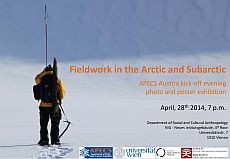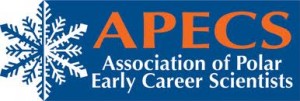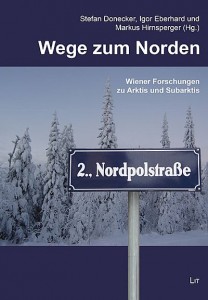CALL FOR PAPERS für den Arktis und Sibirien Workshop bei der DGV Tagung 2015 in Marburg
Das Koordinationsteam der RG Zirkumpolargebiete und Sibirien lädt Sie zu dem Workshop “Departures in the Circumpolar North and Siberia“ / „Aufbrüche im Zirkumpolaren Norden und Sibirien“ (Ausschreibungstext siehe unten) bei der kommenden DGV-Tagung in Marburg vom 30.9.-3.10.2015 ein.
Als Gastredner hat Mark Nuttall, University of Alberta CAN, zugesagt.
Inhaltlich orientiert sich der Workshop am übergreifenden Thema der DGV-Tagung 2015 „Krisen. Re-Formationen von Leben, Macht und Welt”. Nähere Informationen zur Tagung und die Call for Papers der anderen Workshops finden Sie unter: www.dgv-net.de.
Bitte beachten Sie, dass auf der Tagung pro Person nur ein Vortrag gehalten werden darf. Der Workshop wird in Englischer Sprache durchgeführt werden, mit der Möglichkeit Vorträge auch auf Deutsch zu halten.
Vorschläge für Präsentationen in Form von 1. einem Abstract (max. 1200 Wörter) sowie 2. einem kurzen Abstract für das Programmheft (max. 300 Wörter) senden Sie bitte bis zum 15. Februar 2015 an: zirkumpolargebiete-sibirien@dgv-net.de
Workshop-Organisation: Verena Traeger, Sophie Elixhauser, Gerti Eilmsteiner-Saxinger, Joachim Otto Habe
Über eine rege Teilnahme würden wir uns sehr freuen!
“Departures in the Circumpolar North and Siberia”
In situations of crisis established structures are breaking apart. Crises, however, also create opportunities for change and new beginnings. In the Circumpolar North, the preparation for crises involving complex decision-making and departures formed part of people’s daily lives for thousands of years. Moreover, survival strategies based on subsistence were part and parcel of a continual adaptation to changing environments and living conditions.
In the recent past, the circumpolar region has undergone far-reaching changes induced by colonialism and missionary activities leading to forced relocation and the introduction of a settled lifestyle, boarding schools and capitalist or socialist economic systems, accompanied by massive resource exploitation. Environmental pollution and climate change are becoming ever more acute, affecting subsistence and mobility practices, people’s environmental perceptions and sense of place, the stability of food security and cultural identities. Past crises have continued to affect the inhabitants over the course of many generations up until the present. A loss of indigenous traditions, languages and oral history as well as a lack of prospects, a rising propensity for violence, high suicide rates and drug abuse are some of the consequences. Across the Arctic region and Siberia various responses may be observed, and different solutions with regard to resource control, political self-determination and the recognition of indigenous rights are being developed. They reflect national sovereignty and democratic processes and show that people are ready to actively shape their future. This workshop invites broader theoretical, applied and comparative contributions as well as thematic papers and ethnographic case studies from the Circumpolar North and Siberia (presentations can be held in English or German).
„Aufbrüche im zirkumpolaren Norden und Sibirien“
In Krisensituationen brechen stabile Strukturen auf. Gleichzeitig bieten Krisen Chancen zu Veränderungen und zum Aufbruch. Im zirkumpolaren Norden waren die Vorbereitung auf Krisen und damit verbundene Entscheidungssituationen und Wendepunkte seit Jahrtausenden Teil des Lebens. Auf Subsistenz aufbauende Überlebensstrategien waren zudem stets mit der Anpassung an sich verändernde Lebensumstände (v.a. Umwelteinflüsse) verknüpft.
In der näheren Vergangenheit kam es zu besonders rapiden Veränderungen durch Kolonialismus und Missionierung und damit einhergehende Zwangsumsiedlungen und Einführung von Sesshaftigkeit, Internatsschulen sowie kapitalistischen oder sozialistischen Wirtschaftssystemen mit teils großflächigem Rohstoffabbau. Umweltverschmutzung und Klimawandel werden immer virulenter, wodurch Subsistenz- und Mobilitätspraktiken sowie Vorstellungen von Landschaft und Natur massiv beeinflusst und Nahrungssicherheit sowie kulturelle Identitäten instabil werden. Vergangene Krisen wirken über viele Generationen bis heute nach. Verlust von indigenen Traditionen, Sprachen und oral überliefertem Wissen, Perspektivenlosigkeit, steigende Gewalt, Drogenmissbrauch und hohe Suizidraten sind einige der Folgeerscheinungen. Rund um den nördlichen Polarkreis und in Sibirien beobachtet man vielseitige Reaktionen. Unterschiedlichste Lösungen in Bezug auf Ressourcenkontrolle, politische Selbstbestimmung und die Anerkennung indigener Rechte und Interessen wurden und werden entwickelt. Diese spiegeln nationalstaatliche Souveränität und Kontrolle sowie demokratische Prozesse wider und zeigen die Bereitschaft zum Aufbruch auf vielfältige Weise. Dieser Workshop lädt Beiträge ein, die sich entweder mit vergleichenden Überblicksthemen aus Theorie und Anwendung oder mit regionalspezifischen, thematischen Detailfragen aus dem zirkumpolaren Norden und Sibirien beschäftigen. Vorträge können in englischer und deutscher Sprache gehalten werden.



 On April 28th, we celebrate the foundation of APECS Austria, which is part of the international and interdisciplinary Association of Polar Early Career Scientists (APECS). APECS provides a platform for interdisciplinary networking and exchange of researchers working in Arctic and Subarctic regions.
On April 28th, we celebrate the foundation of APECS Austria, which is part of the international and interdisciplinary Association of Polar Early Career Scientists (APECS). APECS provides a platform for interdisciplinary networking and exchange of researchers working in Arctic and Subarctic regions.
